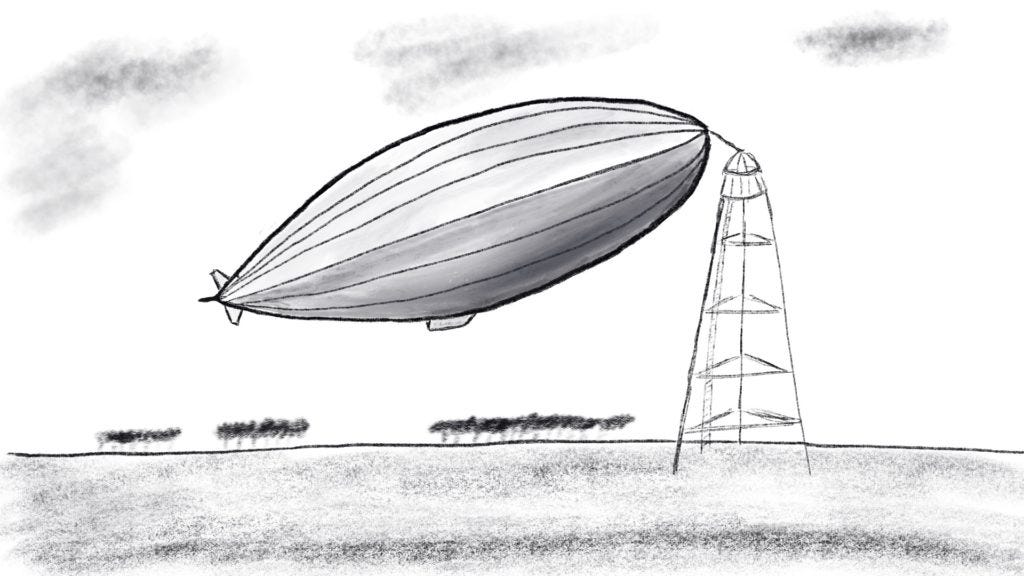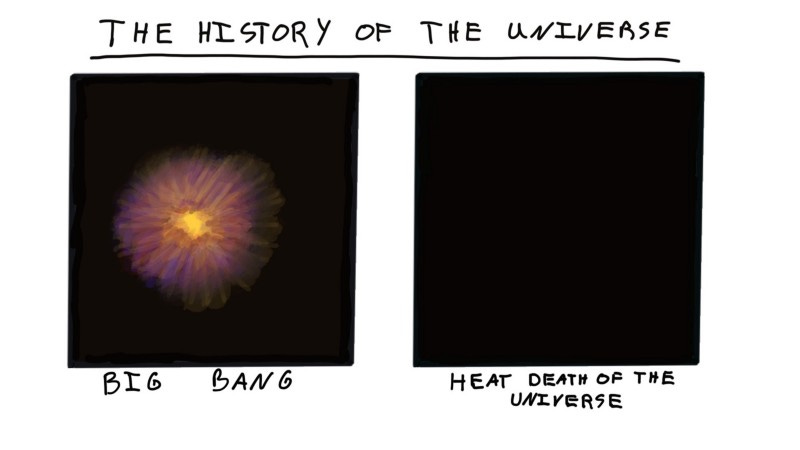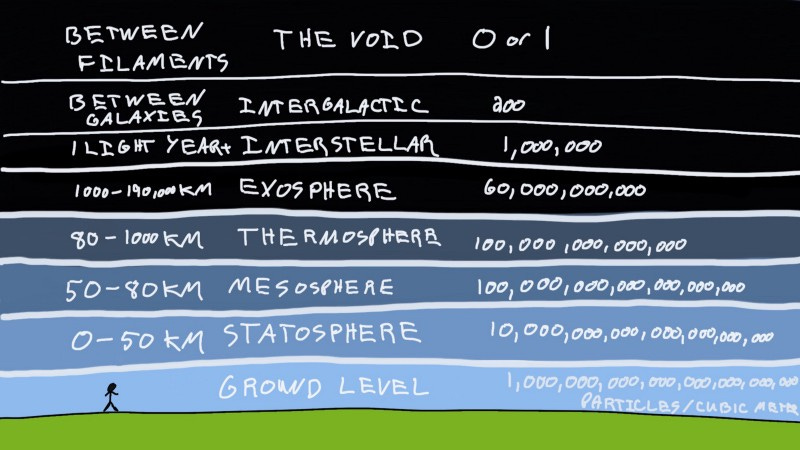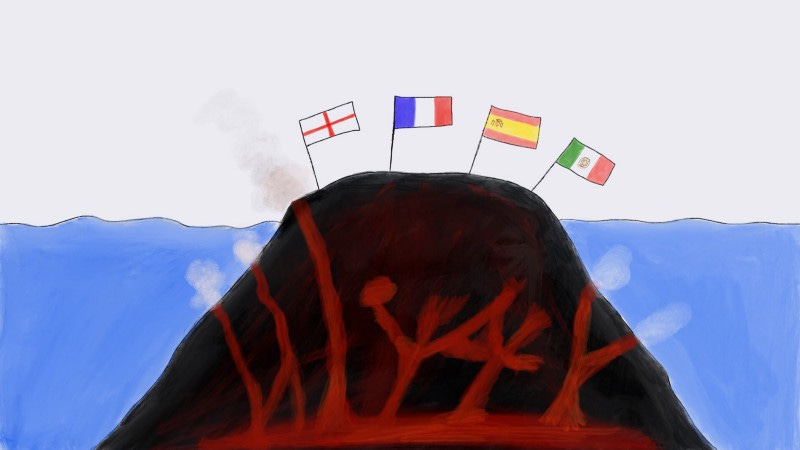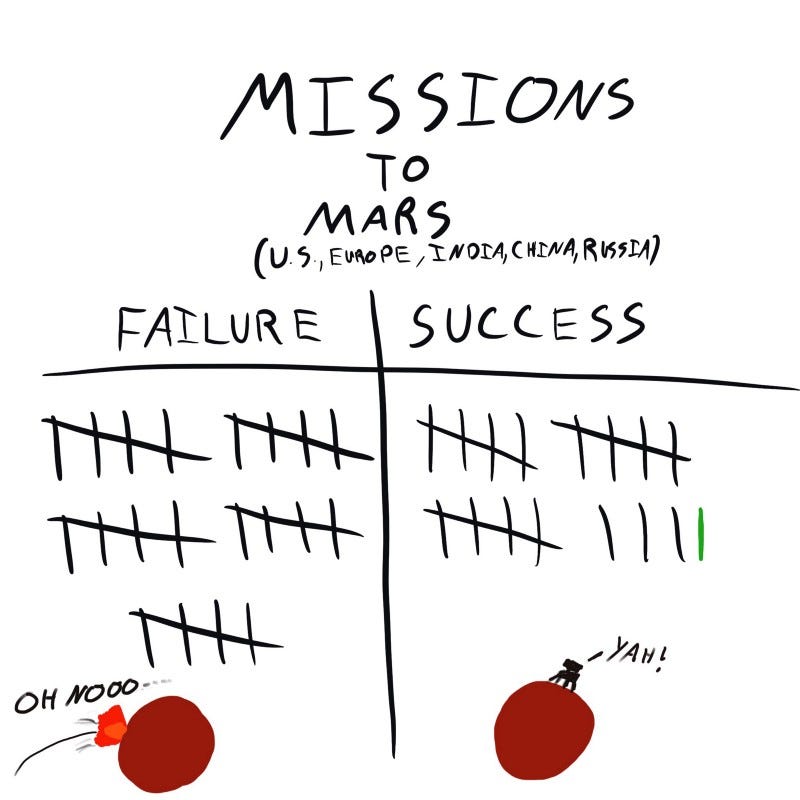18 Things I Learned from Podcasts in 2018
A collection of interesting facts, tidbits, and drawings from the past year
I’ve argued that podcast apps are little portable libraries, where you can access an astounding amount of curated information. A good set of educational podcasts is a great way to learn about the world in expected and unexpected ways.
In the Hurt Your Brain newsletter, I focus on shows that help me understand how the world works a little better. Below are some highlights of what I’ve learned from educational podcasts over the past year, along with some illustrations I made to go with them (that have an embarrassingly high ratio of how long they took to make vs their quality). To see my absolute favorite stories of the year, check out Bello Collective’s 100 Outstanding Podcasts of 2018.
99 Percent Invisible: Airships and the Future that Never was
Learned: There was a time when airships were the assumed future of air travel.
Context: When it comes to audio stories around previous generations’ optimistic/romantic view of the future, no one does it better than 99 Percent Invisible. Like Home on Lagrange, Airships and the Future That Never Was dropped me into an adjacent world that could have been. As they say in the episode, an “airship is [now] a cue in fiction that we are in a world like ours, but more wondrous.” [listen here]
The Anthropocene Reviewed: Canada Geese and Diet Dr Pepper
Learned: Dr Pepper represents the modern economy better than any other beverage. It was engineered by a chemist to not have any natural tasting, real world analog. It is the oldest continuously sold soda in the US, beating Coca-Cola to market by one year. Diet Dr Pepper was released in 1962, also beating Diet Coke by one year.
Context: Author, YouTuber and podcaster John Green is unashamed about his love of Diet Dr Pepper. In this new podcast of his, he chooses two things per episode to review on a five star scale, which takes the form of mini audio essays that are well-crafted and funny. “Diet Dr Pepper, the soda that tastes more like the anthropocene than any other.” [listen here]
Radiolab: Smarty Plants
Learned: Trees can communicate with each other and swap resources through a recently discovered underground “internet of trees”.
Context: In Smarty Plants, Jad Abumrad ribs co-host Robert Krulwich for his excitement around stories about the plant world, calling it his “parade of plants”. But when you combine the ideas of this episode with those of From Tree to Shining Tree, you’ll get a completely new understanding of how amazing boring ol regular trees and plants can be. [listen here]
For bonus reading, here are some more thoughts and drawings about the other cool plant related things you can learn from this episode.
You Are Not So Smart: Tribal Psychology
Learned: Humans will find a way to divide into tribes around literally anything, no matter how trivial.
Context: Humans are tribal. In fact it may be one of our most defining features (bugs?) as a species. This is obvious if you just look around the internet or examine conflicts of any kind. You Are Not So Smartspecializes in bringing to light the reasons why we shouldn’t be so smug about our cognitive abilities. This episode details all the different ways researchers have tested our capacity for forming tribes (hint: it’s endless). [listen here]
Imaginary Worlds: The Book of Dune
Learned: The storyline and themes of Dune draw heavily from religious myths, particularly Islam.
Context: If you are interested in sci-fi or fantasy in the slightest, you owe it to yourself to look through the feed of Imaginary Worlds to see if any topics stand out. They are all really thoughtful explorations of popular fictional worlds. This episode is what finally convinced me to check Dune out from the library. [listen here]
Note: I cheated on this one. It’s from 2017 but I didn’t listen until this year.
99 Percent Invisible: Speech Bubbles — Understanding Comics with Scott McCloud
Learned: For a comic to be successful at great storytelling, the moments chosen are critical. It is a skill to know the amount of detail you want to show. You wouldn’t want to show someone walking across the room using 20 panels. But you also wouldn’t want to depict the entire history of the universe with two panels.
Context: 99 Percent Invisible had a delightful interview with Scott McCloud, an expert on comic strips and graphic novels. This is a world I didn’t know much about but is proof that an interesting interview can be interesting for anyone. [listen here]
Ologies: Cosmology with Katie Mack: Two Parter
Learned: If the entire solar system (dwarf planets and all) were to fit in the palm of your hand, the Milky Way would be about the size of the United States.
Context: Science journalist Alie Ward interviews experts who work in a field that ends in “ology”. I quickly became a fan of Cosmologist Katie Mack. There were lots of great discussions about mind blowing space stuff, including the great analogy of scale mentioned above. [listen to part 1][listen to part 2]
Note: another one that was from the very end of 2017, but I didn’t hear it until the new year
Cosmic Vertigo: Emptier than empty
Learned: In the thermosphere, where the International Space Station orbits, there are still trillions of atoms in every cubic meter of space (which is why they need to calculate friction into the equation to keep it up there). And even way, way outside of our solar system, in the space between stars, there are still millions of atoms in every cubic meter.
And because you can learn at least one mind blowing fact from each episode of this show, here are a few more bonus learnings from season two:
Bigger than big: If our sun was the size of a ping pong ball, Canis Majoris — a red hyper-giant and one of the largest known stars — would have the diameter of a football field. [listen here]
Denser than dense: If you carve out a marble sized object from the surface of a neutron star, it would have the mass of about 100 million elephants, or that of a large mountain. [listen here]
Context: Cosmic Vertigo is one of my favorite shows and season two set out to examine the extremes of our universe. It’s co-hosted by two charming astrophysicists, Dr Alan Duffy and Dr Amanda Bauer. The best kind of factoid is a space factoid, and this show delivers in spades. [listen here]
The Constant: People This Isle
Learned: In the 19th century, a brand new island bubbled up from the surface near present day Italy. True to our cooperative nature, nearby nations decided to share it. Just kidding, they all immediately planted their flag and claimed complete ownership.
Context: One of the only reliable constants throughout history is that we get things wrong. Even Einstein, a true genius, got things wrong (about the nature of the gravitational constant no less). This conversational and often funny history show always teaches me something new about human nature. [listen here]
You Are Not So Smart: The Marshmallow Replication
Learned: The famous marshmallow test is overblown and you shouldn’t put too much thought into if your kid would pass or fail it.
Context: You’ve probably heard of this test and its implications. Kids who are able to delay gratification and double their reward are more likely to be more successful, happier, etc. than those who couldn’t. It’s mentioned in probably every pop psychology book written in the last twenty years. But what if all this is pretty overblown and you shouldn’t exactly be stressing about if your kid can pass the marshmallow test or not? This episode lays it all out beautifully and explains how things like this are never as simple as they seem. [listen here]
The Polymath Project: David Quammen— The Tangled Tree: A Radical New History of Life
Learned: At least six percent of our DNA is from horizontal gene transfer, a concept only recently understood. Instead of branches that split off into smaller and smaller branches of new species that never converge, it is more accurate to think of evolution as a tangled tree, with branches randomly connecting to each other.
Context: David Quammen is a science writer I had never heard of until the many times I’ve seen his name while promoting his new book about evolution. This interview with Charles Chu of the Polymath Projectallows him to fully explain how the understanding of evolution has changed, namely that the branching nature of the evolutionary tree is not quite correct anymore. [listen here]
The Dream: Wanna Swim in Cash?
Learned: One of the most high profile pyramid schemes was an insane scam from the early 80’s called “The Airplane Game”.
Context: This show takes a critical look at pyramid schemes and multi-level marketing. The first 11 episode season does an excellent job helping you understand exactly why that uneasy feeling you have about all the multi-level marketing surrounding you is very justified. [listen here]
99 Percent Invisible: Articles of Interest (Blue Jeans)
Learned: On any given day, half the population of the world is wearing jeans.
Context: A uniformly delightful and insightful series from 99 Percent Invisible producer Avery Trufelman. Each episode looked at a different article of clothing such as Hawaiian shirts or Blue Jeans. [listen here]
On a Mission: The Danger of Going to Mars
Learned: There have been 44 missions to mars, and most of them have been a failure. The recent InSight mission gets to add one to the success column. (Yah!)
Context: A podcast from NASA and the Jet Propulsion Laboratory. I understand that it’s challenging to keep track of all the missions going on these days, but the above statistics still surprised me. [listen here]
Planet Money: The Laws of the Office
Learned: The corporate world is full of informal but pretty much spot on office laws.
Context: Planet Money is a consistently great show about the economy that is probably responsible for more random bits of knowledge in my brain than any other show. [listen here]
History and Literature: The Tower of Babel (Cuneiform)
Learned: The Old Testament is not as old as I imagined, at least compared to other ancient stories. It’s only at about the mid-point when looking at the full timeline of literature.
Context: This show is a fantastic and thorough examination of literature, starting at the very beginning. Be sure to check out the reading material that goes along with each show, like this one. [listen here]
So that’s it. A sampling of some interesting things from 2018 that I still think of on a regular basis. If you like these types of shows, please subscribe to the newsletter and get recommendations twice a month (or so).

